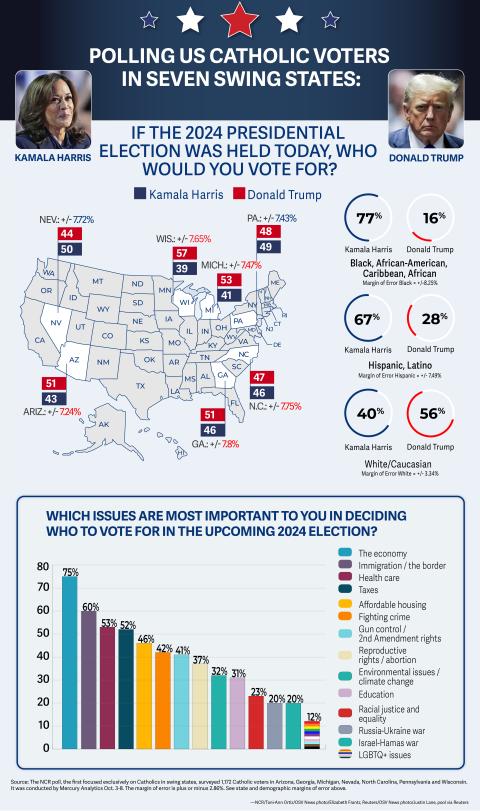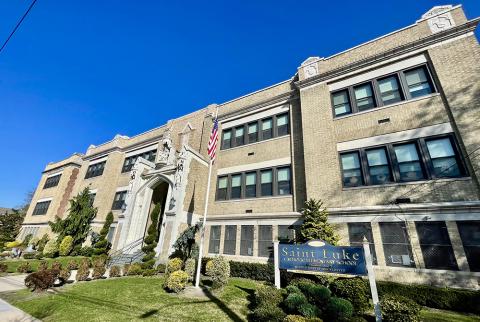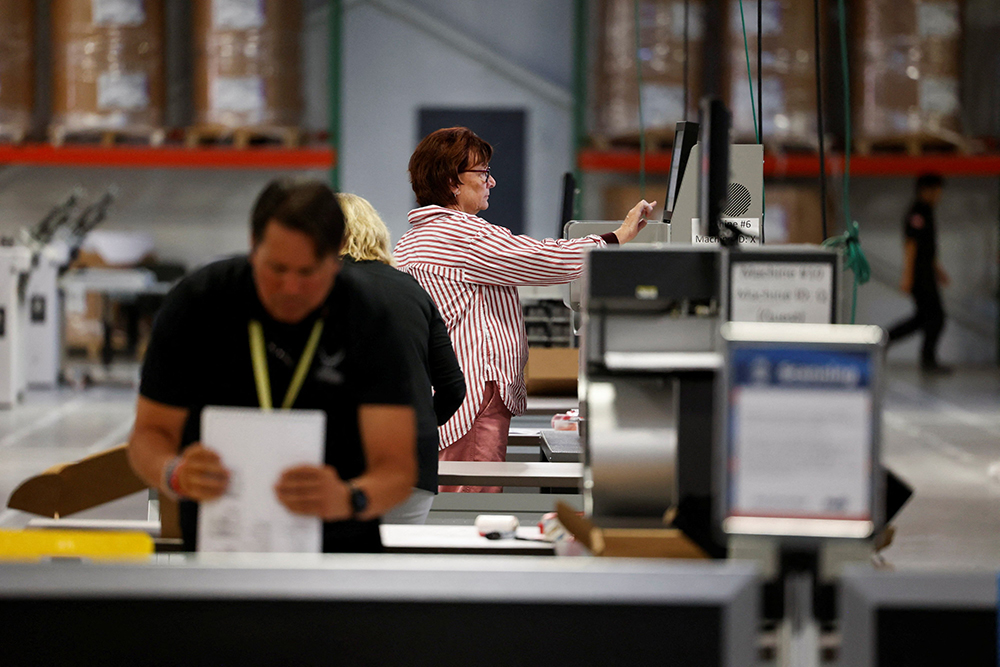
Election officials scan ballots in Philadelphia during the U.S. presidential election on Election Day, Nov. 5, 2024. (OSV News/Reuters/Rachel Wisniewski)
Editor’s note: National Catholic Reporter is covering the 2024 U.S. election live coast to coast until there is a winner. Here, you can find regular updates from NCR and Global Sisters Report staff, including NCR senior correspondent Heidi Schlumpf reporting from Wisconsin and NCR staff reporter Brian Fraga covering developments in Pennsylvania.
We also will be sharing some of NCR's best campaign coverage. All election news and commentary can be found here: https://www.ncronline.org/feature-series/election-2024/stories.
10:02 p.m. ET
Polls remain tight as final votes are cast
BY JAMES V. GRIMALDI
As we await an outcome of the election, we turn to the final polls for hints of what might happen. The race is expected to come down to seven battleground states and the final Emerson College/The Hill poll of those states comes up with a familiar conclusion: too close to call.
Last month, National Catholic Reporter's poll of Catholics in battleground states found a 5 percentage point lead for Republican nominee Donald Trump. The survey of 1,172 Catholic voters in Arizona, Georgia, Michigan, Nevada, North Carolina, Pennsylvania and Wisconsin was conducted by Mercury Analytics Oct. 3-8
Among the more interesting findings, swing-state Catholic voters were more likely to say they support their preferred candidate for reasons that go against church teaching: Trump supporters said they favored his anti-immigration policies and Harris voters backed her views on reproductive rights. Catholic teaching generally favors immigrant rights and opposes abortion.
Findings can be reviewed here.
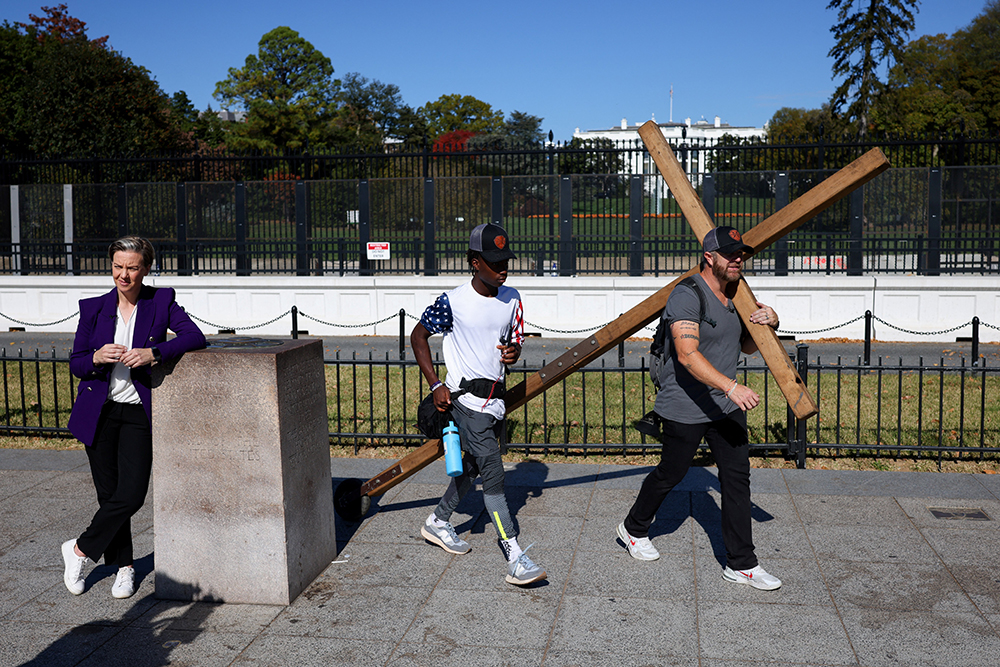
A man wheels a large wooden cross near the White House in Washington as a reporter records a broadcast during the U.S. presidential election on Nov. 5, 2024, Election Day. (OSV News/Reuters/Daniel Cole)
9:33 p.m. ET
Non-endorsements for president make news
BY JAMES V. GRIMALDI
Endorsements became big news this election year, though many think newspaper endorsements have diminishing value.
Controversy swirled after The Washington Post and the Los Angeles Times announced that their editorial pages would not endorse a candidate for president.
After drafting an editorial backing Vice President Kamala Harris, owner Jeff Bezos pulled the endorsement, sparking vocal protests and resignations from some staffers and stoked fears about the newspaper's editorial independence.
The National Catholic Reporter has never endorsed a candidate, as explained in this column. NCR did publish a pre-election editorial and it can be found here.
8:59 p.m. ET
Bishops weigh in, delicately, on Election Day 2024
BY BRIAN ROEWE
What have, and haven't, Catholic bishops said about the 2024 election?
For the most part, the country's prelates have mostly tempered their remarks about the presidential contest between Vice President Kamala Harris and former President Donald Trump. They have touted their voting guide "Forming Consciences for Faithful Citizenship," encouraged voting and addressed state ballot proposals.
Bishops sense it is a delicate moment in the United States, said Massimo Faggioli, a professor of theology and religious studies at Villanova University. "They know that the Catholic voters are very divided," Faggioli said. "So they don't want to look political. They don't want to contribute to the anxiety."
But to some church observers, the historical nature of this presidential election — a sitting president bowing out of a second-term bid, assassination attempts, Trump's indictments and ongoing 2020 election denial, warnings for democracy's future, and specters of post-election violence — called for a different tone and message from U.S. bishops altogether.
Meghan Clark, a moral theologian at St. John's University in New York, called the bishops' approach to this year's election "inadequate to the moment that we are living in."
NCR staff collected statements from cardinals, bishops in swing states and others across the country. Read what they had to say here.
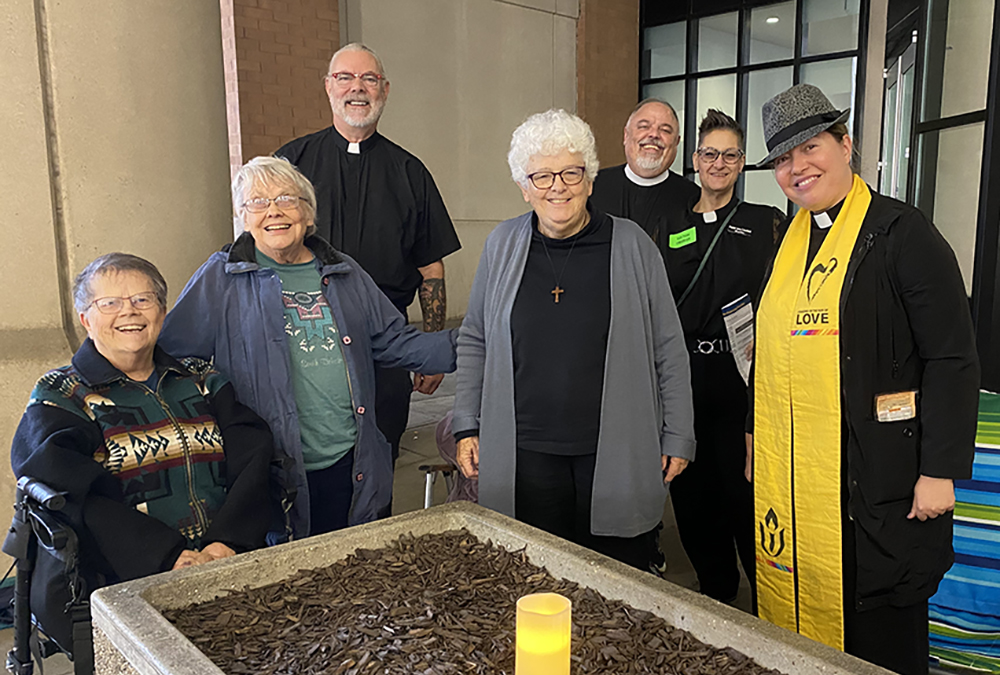
In front row, from left, Srs. Susan Adrians, Karen Walther and Barbara Pfarr, all School Sisters of Notre Dame, joined a prayer vigil for ballot counters in downtown Milwaukee on Nov. 5. (Courtesy of Barbara Pfarr)
8:04 p.m. ET
Sisters, religious leaders pray for Wisconsin ballot counters
BY HEIDI SCHLUMPF
MILWAUKEE — At 6 a.m., as members of the Wisconsin Elections Commission arrived at the Baird Center in downtown Milwaukee to prepare for the opening and counting of absentee ballots, about a dozen religious leaders had already gathered to pray for them.
"We laid hands on them and blessed and thanked them for the work they're doing," said the Rev. Jennifer Nordstrom, senior minister at the First Unitarian Society of Milwaukee.
The group, organized by the Milwaukee Inner-City Congregations Allied for Hope (MICAH), plans to be there until the more than 105,000 absentee ballots from the city of Milwaukee are counted. Unlike some other states, Wisconsin law does not permit counting to begin before Election Day.
"Part of this prayer vigil is to show that religious leaders believe in democracy and believe in the system," said Sr. Barbara Pfarr, who attended with two fellow School Sisters of Notre Dame.
"We're also offering prayers of thanksgiving for all these [counters] who are so generous with their time," she told NCR. "And we're praying that after tomorrow we can figure out ways to govern in such a divided city, state and country."
There was light rain throughout the day, but the prayer vigil was sheltered from the weather. The group of religious leaders sang songs, lit candles and took turns offering prayers.
Pfarr also spent part of the day as an "election chaplain" at a poll in an inner-city Milwaukee neighborhood, where she said turnout was "really fabulous" and included many first-time voters.
Volunteers are taking shifts at the prayer vigil, which was originally scheduled to end at 9 p.m. when the vote counting was expected to be done. Current estimates predict it will likely not conclude until sometime after midnight.
Pfarr said that while voting is a sacred act, Christians are called to do much more. "What's really sacred is being involved in system change. Our sisters do a lot of that."
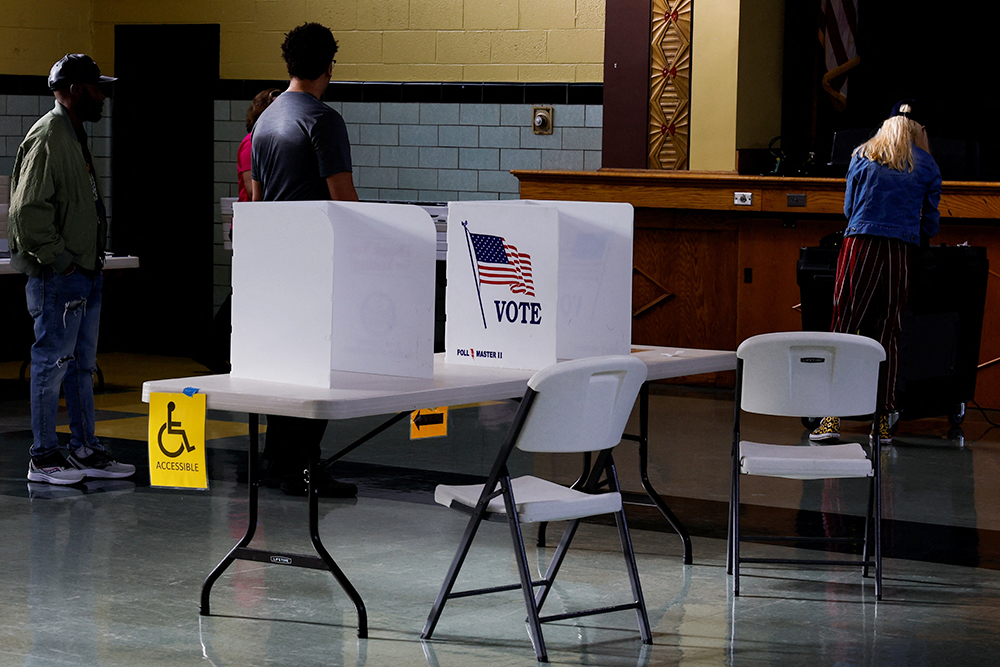
People vote in the U.S. presidential election on Election Day, Nov. 5, 2024, at Holy Trinity Catholic Church in Erie, Pa. (OSV News/Reuters/Shannon Stapleton)
7:24 p.m. ET
'We want to go forward' says Philadelphia Democratic committee member
BY BRIAN FRAGA
PHILADELPHIA — A deejay played hip-hop and R&B music as residents of Philadelphia's Germantown neighborhood turned out to vote Nov. 5 at The Miraculous Medal Shrine.
A steady stream of voters poured into the shrine, which served as a polling place, just after 5 p.m.
"We had a long line out here this morning, and it's been steady since then. Now people are coming in after work," said Darlena Graves, a local Democratic committee member who had been standing outside the polling station since 7 a.m.
"It's a beautiful day for it," she said.
As they left the polling station, most people who agreed to speak with NCR said that they had voted for Vice President Kamala Harris to be the next president of the United States.
"Her policies align with my morals and standards. She's just a better option," said Darrell Washington.
Ana Lamar said she voted for Harris because of her stance in favor of abortion and reproductive rights. "I don't agree with abortion, but every woman, including myself, has a right to their body. And no one but God can ever judge us."
Angela Addison said she voted for Harris because, in her opinion, the vice president is "the only choice."
"We have to go forward, not backward," Addison said. "Donald Trump should have stayed with 'The Apprentice.' He's taken the country in a bad direction."
One voter, Wayne Hamm, told NCR that he wrote his own name on the ballot because he did not approve of either candidate. "I just felt like both candidates are not for me," Hamm said.
But for Graves, the 2024 presidential election presented an opportunity to write a milestone chapter in American history. "Women don't want to go back," she said. "We want to go forward."
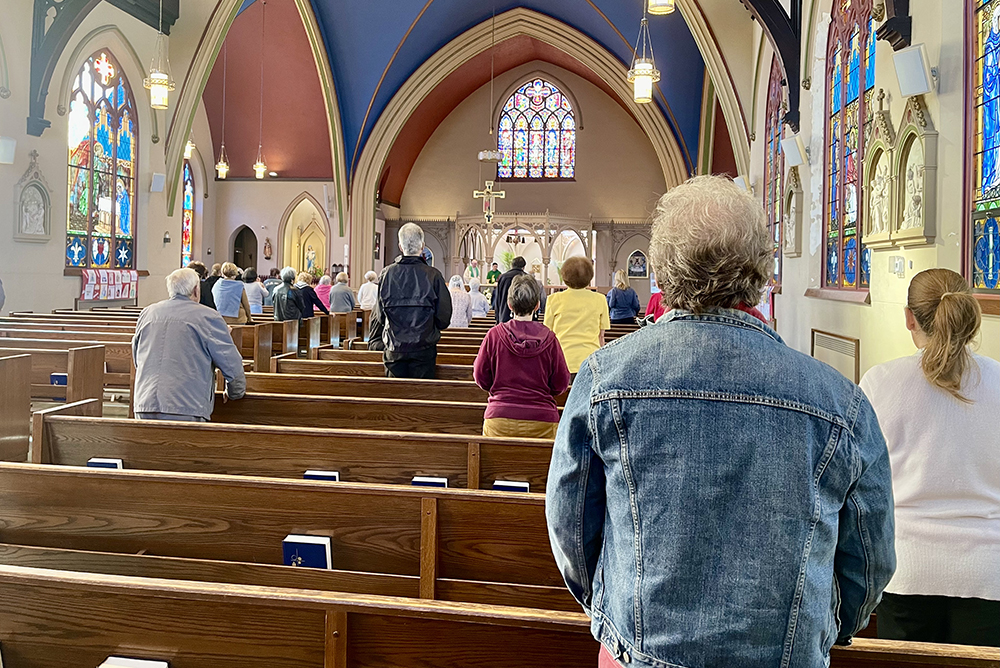
Catholic voters in New York's 3rd congressional district gathered for Mass Nov. 5 at St. Luke's Church in Whitestone, New York. (NCR photo/Camillo Barone)
6:40 p.m. ET
Catholics in Queens, NY, support Trump and GOP congressional candidate
BY CAMILLO BARONE
WHITESTONE, N.Y. – On the afternoon of Election Day, NCR spoke to more than 20 Catholic voters near a polling site in the New York City borough of Queens, and almost all of them said they had voted for Donald Trump as president and Mike LiPetri, the Republican candidate for Congress.
The group had just attended Mass at St. Luke Catholic Church in Whitestone and the parish school was their polling site. Two of the 20 voters who spoke to NCR did not want to express their votes publicly.
The election that took place here, in the state's 3rd congressional district, was also for the U.S. Congress representative in the wake of Congress expelling the former Republican Rep. George Santos in December 2023. In August, Santos pleaded guilty to identity theft and wire fraud. Democrat Thomas Suozzi was elected to fill this slot in February.
Suozzi is now seeking a new term in the same swing district against LiPetri, a former Republican New York State representative.
The group of voters who spoke with NCR also said they voted "no" on the referendum for Proposition One, an amendment to New York State's constitution that would bar discrimination based on issues including "sexual orientation, gender identity, gender expression, pregnancy, pregnancy outcomes, and reproductive healthcare and autonomy."
In a September official statement, the New York State Catholic Conference defined Proposition One as "a wolf in sheep's clothing that could lead to darkness for many New York families," urging all Catholics in New York to vote against it.
When asked by NCR if she had been influenced by the bishops' statement or her parish's stance in deciding on what to vote, a Catholic voter named Peggy, who did not want to share her last name, said: "My parish did a good job in explaining what Proposition One is. I think the information they gave me was very helpful."
"We've embraced cultural Marxism, and as a nation, we're not going to be able to survive unless we change," said Dennis, another Catholic voter who did not share his last name. "We've abandoned our faith, and when we abandon the faith, everything starts to break apart, and that's what's happening."
Another Catholic voter, who asked to be anonymous said she supported both Trump and LiPetri, and said that the right to abortion is "murdering an infant, killing a child, and they can do it up to nine months." Abortions in New York are only legal at less than 24 weeks unless the woman's health or life is at risk.
6:19 p.m. ET
Disappointing turnout in Illinois brightened as heavy rains finally end
By DAN STOCKMAN
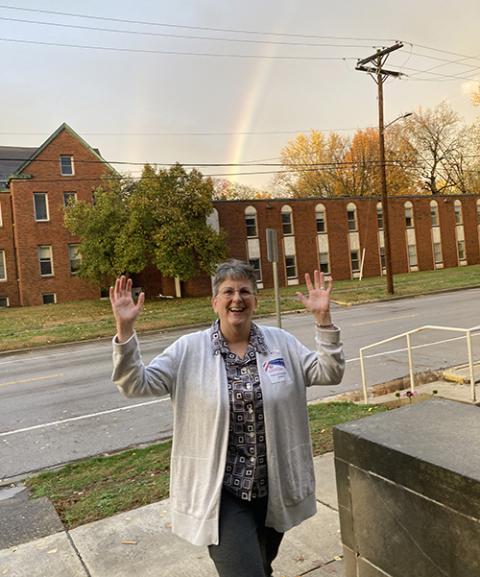
Springfield Dominican Sr. Beth Murphy takes a break from being an election judge to pose Nov. 5 in front of a rainbow over the city of Springfield, Illinois, a welcome sight after a day of heavy rain. (Courtesy of Beth Murphy)
Springfield Dominican Sr. Beth Murphy says her first-ever experience as an election judge has been a good one, but she wishes she would have been busier. Heavy rain all day seemed to depress voter turnout, she said: Out of about 700 voters in the precinct she is working, about 150 voted early and about 140 showed up today to vote in person.
Murphy is an election judge for Sangamon County, Illinois, where the capital city of Springfield is located. Despite the low turnout, there have been touching moments, such as young people voting for the first time, and people with disabilities using a special machine so they can cast their ballots as well.
"There was also a man who had been in prison for 20 years — this was his first opportunity to vote in all those years, so it was very emotional for him," Murphy said.
She is working at the same precinct she votes in, so she has been seeing her neighbors all day, which made it a kind of community experience, she said.
But the rain certainly dampened things: At times it came down in torrents. "People in the parking lot who got caught in the rain, they were just soaked," Murphy said.
But then it stopped, and a rainbow filled the sky. Now, she said, everyone's phone is buzzing with friends sending photos of the bands of color.
"Apparently everybody in the city is seeing this rainbow," she said. "It seems hopeful."
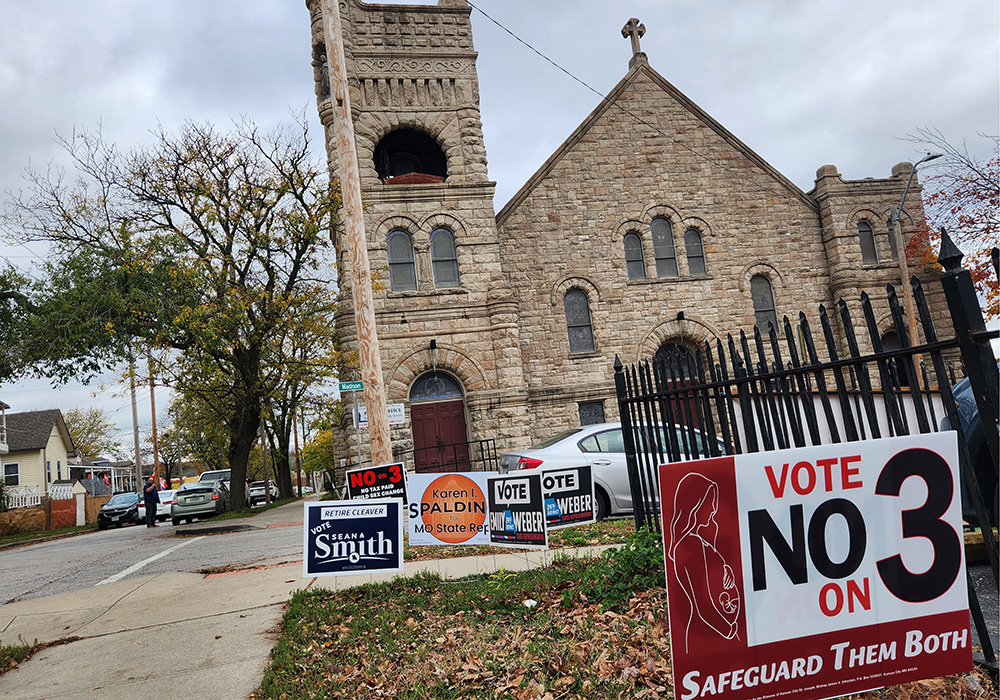
Signs opposing Missouri's Amendment 3 are posted outside Sacred Heart Guadalupe Catholic Church in Kansas City, Missouri. The proposed amendment would establish a right in the state constitution to abortion. (NCR photo/Brian Roewe)
6 p.m. ET
Catholics weigh abortion amendment in Kansas City
By BRIAN ROEWE
KANSAS CITY, MO. — Harris-Walz signs hang alongside a statue of Mary at a house across the street from Sacred Heart Guadalupe Catholic Church. A block away, the parish hall is a polling place where voters cast ballots on the presidential race and a slew of ballot proposals, including a repeal of the state ban on abortion.
Amendment 3 would establish in the state constitution a right to abortion and contraceptives and repeal the near-universal ban that went into place when the U.S. Supreme Court struck down Roe v. Wade in 2022.
The "Vote No on 3" signs outside Sacred Heart church stake out the church's position on the amendment. Bishop James Johnston sent a letter in September to all parishioners in the Diocese of Kansas City-St. Joseph on the "extreme consequences of Amendment 3."
Kevin Scherr didn't see the letter, a Catholic who moved to Kansas City two years ago from Denver. Nor did John Baska, a parishioner at Our Lady of Perpetual Help Church in midtown. Both still voted against Amendment 3.
"My belief is if we don't know the line where life starts, I'd rather err on the side of saving a life," Scherr said.
Jenny Prater didn't see the letter either, but heard about it and felt it was "inappropriate." She voted yes on 3.
"While I don't agree with it for religious purposes, I believe in the separation of church and state. I believe that should be an individual choice," she said.
Prater said she once considered herself "very much pro-life" but that has changed.
"I feel like sometimes the Catholic Church draws lines instead of circles," she said.
Sharlene Durris grew up Catholic but now considers herself more spiritual than religious. Walking out of the parish hall with family, she shared she too voted for Amendment 3.
"I am a Christian. Yes, I believe that women shouldn't get abortions. But what I do believe, in this new society, a woman still should have a choice to make her own decisions," she said, adding especially in cases of rape and where the woman's life is at risk.
5:10 p.m. ET
11th-hour cash deluge aims at Nebraska abortion measures
BY JAMES V. GRIMALDI
Something funny is going on in Nebraska.
One of 10 states with abortion-related measures on the ballot, Nebraska has been inundated with millions of dollars in last-minute campaign cash, and it is coming through an unusual and circuitous route.
The pattern was detected as part of a joint-investigation between the National Catholic Reporter and Mother Jones. Heidi Schlumpf and Russ Choma last week reported that Catholic organizations around the country had contributed more than $1.9 million to anti-abortion campaigns regarding the ballot initiatives.
Much of that cash is being spent by a new group called Common Sense Nebraska, which has shelled out a remarkable $4.9 million in the three weeks since it was formed.
Who is behind that money? Find the details here. You might find them surprising.
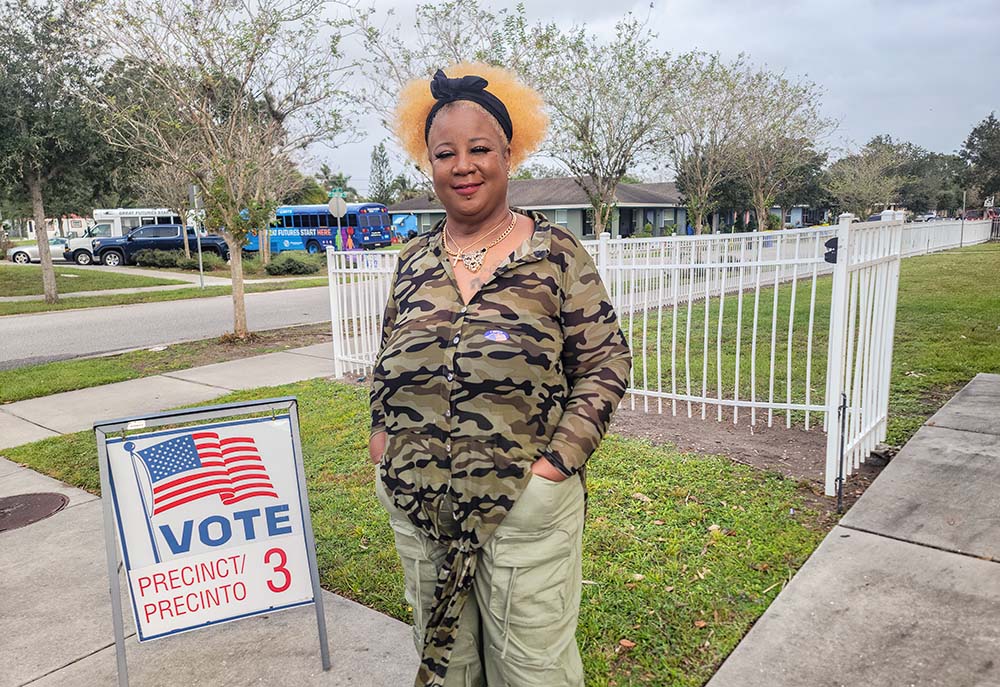
Kimberly Jackson Brown in Indiantown, Florida (NCR photo/Gail DeGeorge)
4:48 p.m. ET
Florida voters on 'choosing your Barabbas wisely' and struggling with inflation
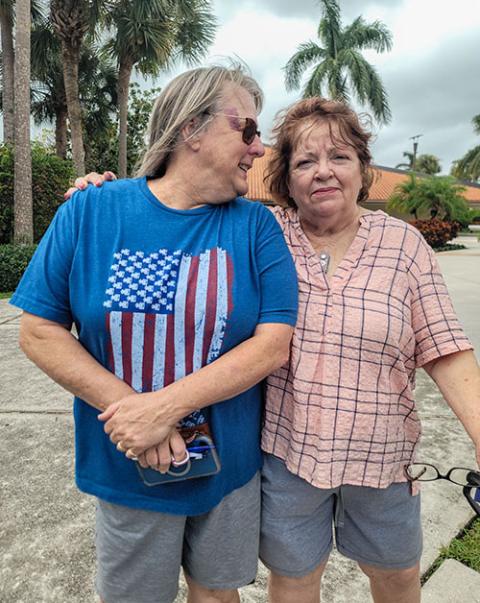
Sabra Myers and Maggie Thomson in Jupiter, Florida (NCR photo/Gail DeGeorge)
By GAIL DeGEORGE
INDIANTOWN and JUPITER, FLORIDA — When Kimberly Jackson Brown woke up on Election Day, she turned to prayer as she does every morning. Exiting the Boys and Girls Club of Indiantown, which served as one of two polling places for the village of 6,700 in rural western Martin County, she stopped long enough to impart the insight she gleaned from her morning meditation.
She's lived in Martin County, mostly in Indiantown, for about 50 years. The anti-immigration rhetoric stung hard in Indiantown, where 57% of the population in 2022 was Latino, 21.5% Black and 19% white non-Hispanic.
"I was praying and asking the Lord to help me make the right decision," she said. She started thinking that "this is much like Jesus and Barabbas — how they stood before the council and people were asked who they wanted and they cried out, 'Give us Barabbas.' "
This was a mean-spirited person who had committed all kinds of crimes, "but the people still cried out, 'Give us Barabbas,' versus someone who had not done anything against the people or committed any crimes," she said.
"Today, anything that happens is going to be what God allows to happen but I would tell people, choose your Barabbas wisely, because you've got to live with your choices."
About 30 miles away in Jupiter in northern Palm Beach County, Sabra Myers and Maggie Thomson listed a litany of issues they were concerned about: the economy, crime and inflation.
"My husband is 66 years old and he's working three jobs to make ends meet," said Myers, who is a Florida native born in Sarasota.
Thomson concurred. "I'm 82 and it's harder to make ends meet," she said.
A man wears a hat with stickers on Election Day, Nov. 5, for the U.S. presidential election in the Manhattan borough of New York City. (OSV News/Reuters/Andrew Kelly)
3:35 p.m. ET
Sisters plan online election night contemplation event
BY CHRIS HERLINGER
The Dominican Sisters of Hope in Ossining, New York, have an antidote to the tensions surrounding the Nov. 5 presidential election: silence.
The congregation plans an online election night contemplation event, beginning at 6 p.m. EST and running through 10 p.m.
The event is for anyone "who could use some time in community away from the news cycle on election night," the congregation's announcement said.
The congregation urges friends to join the sisters in an hour-long contemplation 6-7 p.m, followed by a sister offering a meditation every half hour until 10 p.m.
The sign up is here. Participants will receive a Zoom link before the program.
The event is free and open to all.
3:20 p.m. ET
Black Catholic reflects on common good after casting her vote
By KATIE COLLINS SCOTT
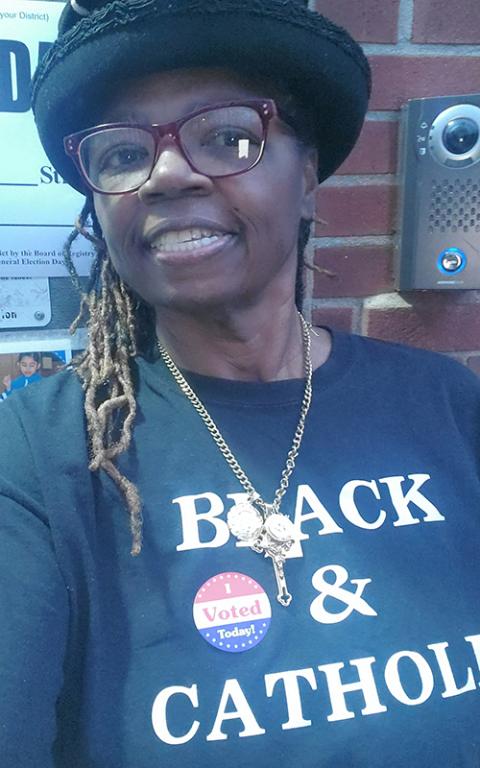
Valerie Lewis-Mosley, Catholic theologian and retired nurse, snaps a selfie after voting early Nov. 5 in New Jersey. (Courtesy of Valerie Lewis-Mosley)
Valerie Lewis-Mosley, donning a "Black & Catholic" T-shirt, arrived with her husband to vote in Essex County, New Jersey, at 5:50 a.m. today, 10 minutes before doors opened. A line of 100 people had already formed, said Lewis-Mosley, a retired nurse and an adjunct professor of theology both at Caldwell University in New Jersey and Xavier University of Louisiana's Institute for Black Catholic Studies.
Catching her breath after the whirlwind morning that also included delivering two lectures at Caldwell, Lewis-Mosley reflected on her vote for Vice President Kamala Harris.
"What's on my mind and heart right now is what has been on my mind and heart for some time: the continuation of our sacred democracy and the Catholic principle of the common good," she told NCR.
In a political poll commissioned by NCR, sizable majorities of Black and Hispanic voters in seven battleground states said they planned to vote for Harris. Black voters have played a key role in U.S. elections and both parties have courted their votes in the lead-up to today.
Lewis-Mosley pointed out that where she voted was less than 20 minutes away from New York's Madison Square Garden, where an Oct. 27 rally hosted by Trump included racist and vulgar comments.
"It petrifies me that this nation has resorted to normalizing such behavior," she said. "Our democratic process is really a gift, and my hope is that we will be a nation that represents every people around the globe.
"If we adhere to the Catholic social teaching of the common good, then we know we are speaking about the good of all people — not just those who are powerful, those who are wealthy, those who are white, but we are concerned about all God's children," said Lewis-Mosley. "My hope is when the polls close tonight, the voice of the people will prevail."
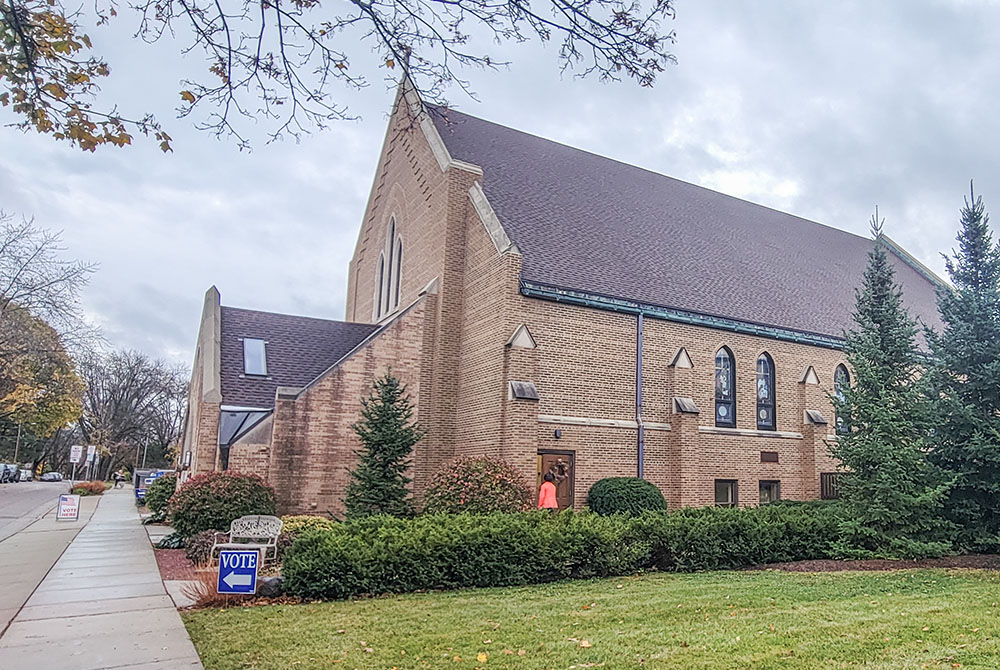
Blessed Sacrament Parish in the Regent neighborhood of Madison, Wisconsin, is a polling place. (NCR photo/Heidi Schlumpf)
3:13 p.m. ET
Wisconsin parish an island of red in a county's sea of blue
BY HEIDI SCHLUMPF
MADISON, WIS. — In the Regent neighborhood on Madison's southwest side, Harris-Walz signs are frequent lawn ornaments. Voters leaving a poll located in the neighborhood's Catholic school told the National Catholic Reporter they leaned Democratic and were voting for Vice President Kamala Harris.
Madison, home to the state government and the University of Wisconsin, is known for its high voter turnout and reliably Democratic voters. Some say Madison's Dane County could be key to the swing state and the entire election.
Inside Blessed Sacrament Church, the more than 30 of the faithful gathered on Election Day had a different view.
A Novena for Faithful Citizenship before Mass invoked Mary to "help us conquer the menace of evil which so easily takes root in the hearts of the people today." Parishioners who spoke with NCR said abortion was their primary issue and why they favored former President Donald Trump.
Tom, a retired physician who asked that his surname not be used, said no political party completely matches his values, but that his conscience could not allow him to vote for "anyone that supported child sacrifice."
"I don't vote for the person," he said. "I vote for what they stand for, what their party stands for."
Another young father said he was concerned about the injustice of anti-abortion protesters who have been imprisoned for blocking abortion clinics. He backs Trump.
At the 8:30 a.m. Mass, Fr. Cristobal Asenjo prayed for a peaceful Election Day. His homily emphasized that all are welcome in the church, but the church's purpose is to reform and redeem believers.
"No matter what other important things are going on in your life, coming to church is the most important thing you can do," said Asenjo, who is a Schoenstatt priest from the Marian movement founded in Germany. The Schoenstatt Fathers replaced the Dominicans who left the parish in June after more than 100 years.
Outside the voting booths, Linda Clifford said the Catholic values she learned growing up are what informed what she called a clear choice for Harris.
"It's a contest between sanity and insanity, between compassion and hatred," Clifford said.
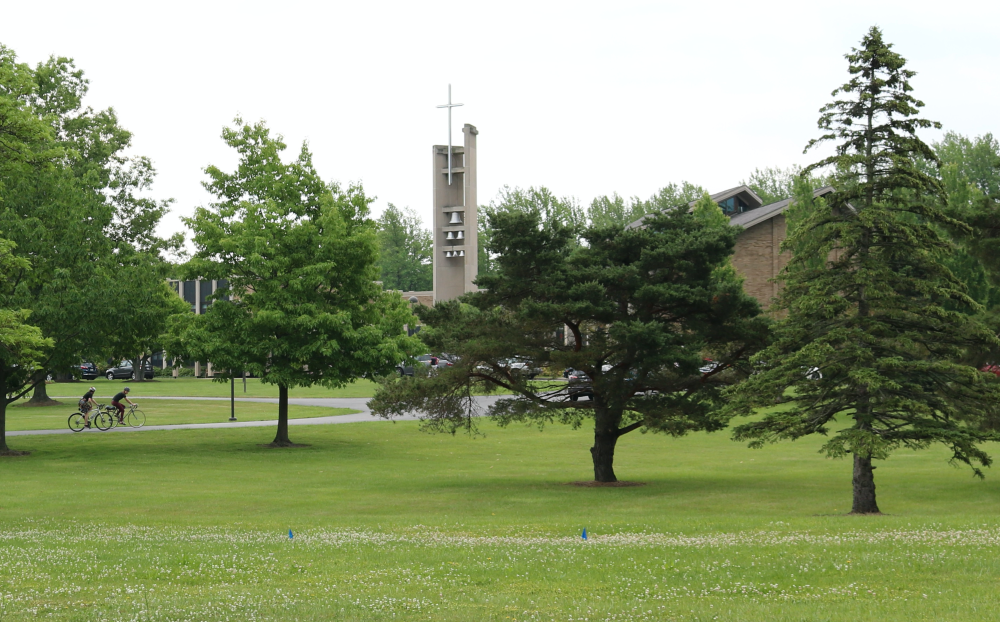
The Mount St. Benedict Monastery is home of the Benedictine Sisters of Erie in Erie, Pennsylvania (Courtesy of the Erie Benedictines)
3:00 p.m. ET
Controversy over canvasser at convent continues
BY DAN STOCKMAN
The Erie Benedictines were really hoping this would be over by now.
But the right-wing activist who, in a social media post Oct. 22, accused them of voter registration fraud has doubled down on his accusations. He now alleges he is the victim of a plot to make his organization look bad.
The original post, by Cliff Maloney, the founder of a group called Pennsylvania Chase that knocks on doors to make sure Republicans in Pennsylvania return mail-in ballots, says one of its workers went to the monastery and found that voter registration rolls list 53 voters at the address.
"BREAKING: a member of the PA CHASE discovered an address in Erie, PA today where 53 voters are registered. Turns out it's the Benedictine Sisters of Erie and NO ONE lives there," the post says. It includes a video of a list of sisters' names and ages, then goes on to say "Our attorney's (sic) are reviewing this right now. We will not let the Dems count on illegal votes."
The 55 nuns who live there issued a statement the next day, calling Maloney's post reckless and defamatory. They say no canvasser ever came to their door and anyone who did would never be told no one lives there.
Mother Jones reported Nov. 4 that Maloney not only refuses to back down, but insists the sisters somehow conspired against his group.
"When reached for comment by Mother Jones on November 1, Maloney refused to admit any error, and insisted that a 'staff member' — possibly a receptionist, he thought, 'or whatever the politically correct term is these days' — at the monastery had deceived his ballot chaser into believing no one lived on the property as part of a deliberate plot 'to paint [Pennsylvania Chase] as election deniers,' " the magazine reported.
Benedictine Sr. Linda Romey, the congregation's coordinator of communications, noted the receptionists at the monastery are sisters, not staffers.
" 'Mr. Maloney can insist all he wants but his insisting does not change reality, at least not on this planet,' " she told Mother Jones. " 'It is an outright falsehood that he continues [to] promote … The fact is that PA CHASE and Mr. Maloney cannot admit they made a mistake and take responsibility for posting misinformation. It's that simple.' "
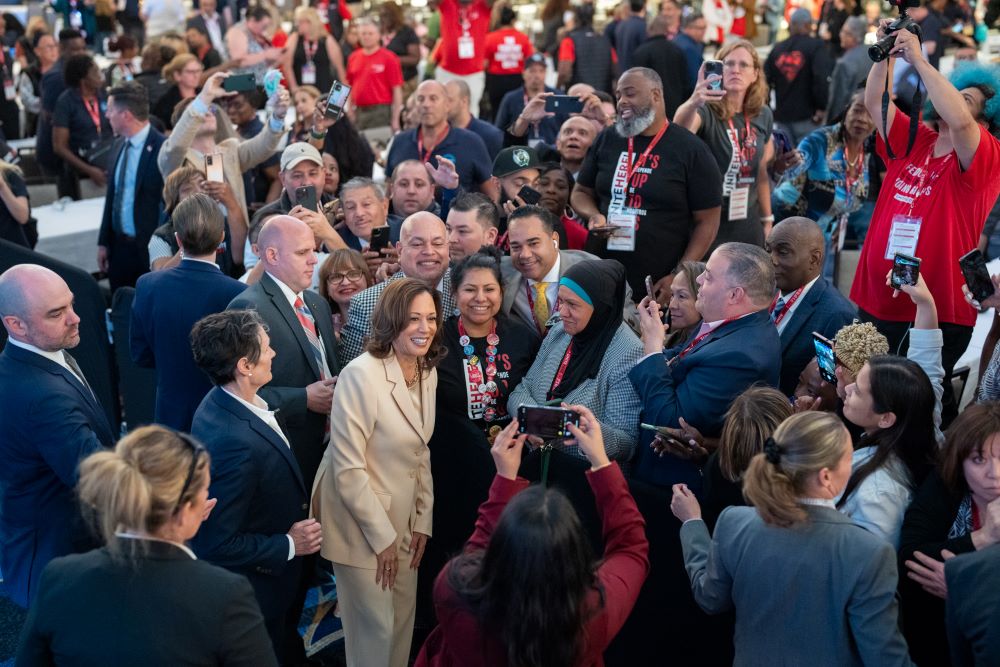
Vice President Kamala Harris poses with attendees after speaking at the UNITE HERE Constitutional Convention June 21 in New York City. (Official White House photo/Lawrence Jackson)
1:45 p.m. ET
UNITE HERE's canvassers crisscross 10 states
BY MICHAEL SEAN WINTERS
Many people are familiar with the Culinary Union in Las Vegas, Nevada, and the influence its members have on elections. That union is part of UNITE HERE, which represents hotel and restaurant workers nationwide. I reached out to them today to ask about their get-out-the-vote efforts for the Harris/Walz ticket.
Some 2,000 UNITE HERE canvassers spread across 10 states: Nevada, Arizona, Pennsylvania, North Carolina, Georgia, Michigan, Ohio, California, New York and Maryland. Although the last four states are not considered battlegrounds in the presidential contest, they have important House and Senate races.
In Pennsylvania, 400 canvassers knocked on some 1,450,000 doors, and had 175,000 individual conversations. That is a larger number than the margin of victory in Pennsylvania in either 2020 or 2016! In Arizona, 1,200,000 door knocks yielded more than 200,000 individual conversations. If Ruben Gallego wins the Senate seat in Arizona, he needs to send flowers to UNITE HERE.
"This year, UNITE HERE had more canvassers in the field and we knocked on more doors than ever before — nearly four million — because this is one of the most important elections of our time," said UNITE HERE President Gwen Mills. "In 2024, we are voting to decide whether we will continue moving forward, or whether we will instead be forced to defend our fundamental rights as union members, people of color, immigrants, women, and more.
"Our canvassers take leaves of absence from their jobs and dedicate months of their lives to knocking doors and speaking with voters in their communities. The conversations they have can make the critical difference when an election is this close. When a voter is on the fence on whether to even vote at all, there is no substitute for a face-to-face conversation with someone who has faced the same struggles, and can help them understand why their vote does matter."
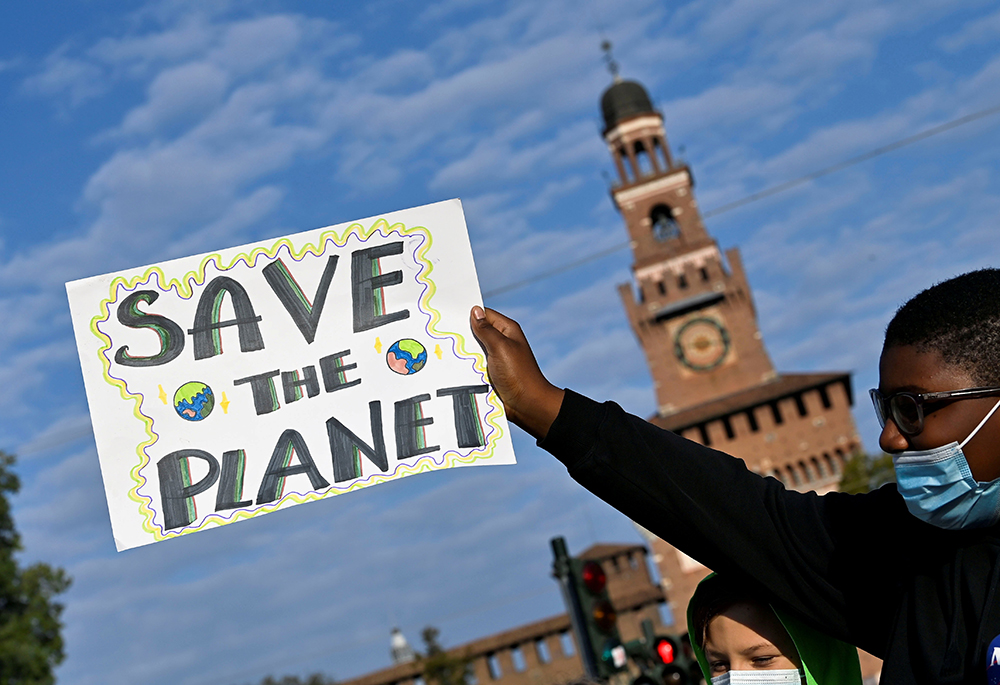
A demonstrator holds up a sign as he attends a Fridays for Future climate strike in Milan Oct. 1, 2021, ahead of the U.N. Climate Change Conference in Glasgow, Scotland. (CNS/Reuters/Flavio Lo Scalzo)
1:35 p.m. ET
The view from Milan on the 2024 election
BY MICHAEL SEAN WINTERS
Paolo Foglizzo is an editor at Aggiornamenti Sociali, a monthly journal concerned with social justice issues and Catholic social teaching in Italy. I asked him about his thoughts as Americans go to the polls.
"Thinking of today's world (and I mean today literally) from a foreigner's point of view, the most important thing which is at stake in these elections is peace," Foglizzo writes. "Whether it is Ukraine or the Middle East, it has been clear in the past weeks and months that nothing will change in terms of spaces for dialogue and attitudes of the different actors until we know who will live in the White House for the next four years. But no change means that in the meantime rockets and drones keep on to flying, bombs are dropped … and people die. I am well aware that the new president will have no magic power to stop conflicts overnight, but his or her stances can make the difference. Or at least open some spaces for hope."
Foglizzo continued:
Something very similar goes for my second concern relating to the U.S. election, which is the environment. Although science is very clear about it, and so is Catholic social teaching, climate change remains a highly ideological issue in the U.S. as in no other country in the world. Quite easily, it becomes a flagship issue too, used to remark political identity at a cheap price (at least in the short run). Who wins the elections will make the difference about climate change like few other issues. As always, the American position will become the benchmark for many other countries too.
I have a final concern regarding U.S. elections: they are heavily mediatized on a global scale and so they capture and shape the global political imagination. The way U.S. elections (and politics) are run has become a sort of global standard, also in terms of which language, discourse and behavior is considered appropriate.
Over the past 30 years, for example, Italian politics has drifted towards a bipartisan pattern that has little to do with our political tradition and the way political affiliation and political identity work in this country. We still have a plurality of parties, they can form coalitions, but merging parties does not work and so we are far from real bipartisanship. We could say we are trying to walk in someone else's shoes. That drift has brought about much of what is commonplace in American politics and campaigns: extreme polarization, hate speech, delegitimization of the opponent, etc. The U.S. is ahead of us in that line, but we seem to be rushing to reduce the gap.
In many ways, watching the American campaign is like catching a glimpse of the (unpleasant) future we seem to be inevitably bound to. We all know this is no healthy way for democracy. Building an alternative becomes a common goal and a global appeal. I dare say especially for Catholics, since our social doctrine has so much to contribute about what promoting common good entails.
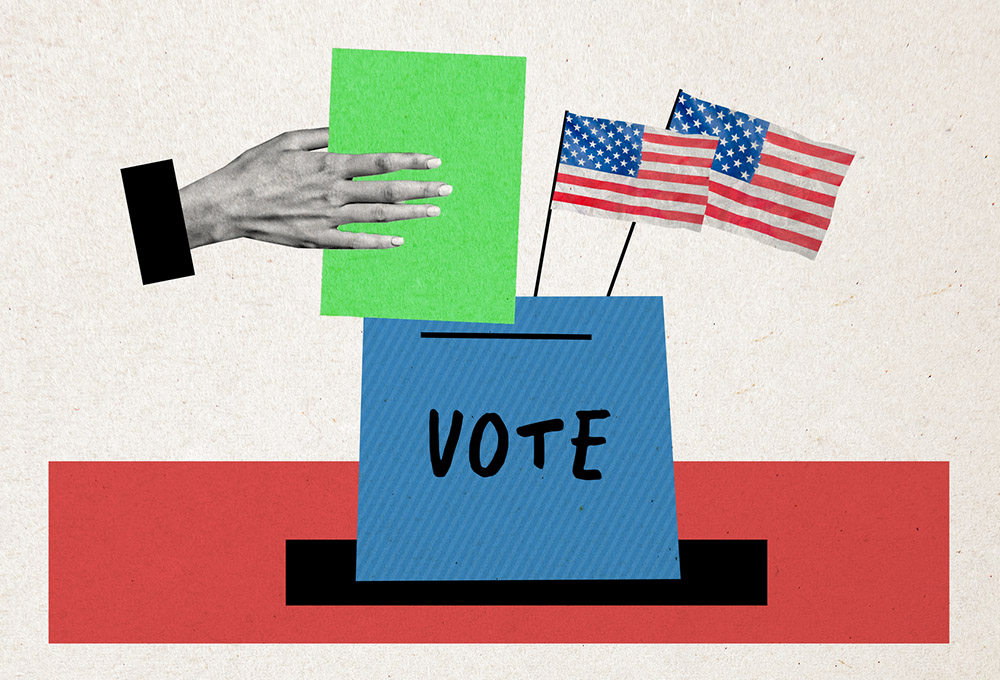
(Dreamstime/Roman Samborskyi)
1:25 p.m. ET
In turnout election, what role will environmental voters play?
By BRIAN ROEWE
As polls indicate a closely divided electorate, any segment of voters could be decisive in who becomes the 47th president of the United States.
Environmentalists are one of them.
According to the Environmental Voter Project, a nonpartisan get-out-the-vote organization based in Boston, more than 8 million environmentalists did not vote in the 2020 election.
This election, Environmental Voter Project has aimed to reach 4.8 million low-propensity and first-time voters in 19 states who their data suggest care about the environment. As of Oct. 31, the group reported 335,500 of its targets had already cast ballots.
Environmental Voter Project has hosted phone-banking shifts for months, with more than 1,300 volunteers making calls since Nov. 1. GreenFaith is among those taking part.
Maria Wood, a history graduate student at St. John's University, in New York, has taken part in two GreenFaith-Environmental Voter Project phone-banking sessions.
"I thought it was super cool," the 25-year-old Catholic from Wisconsin told EarthBeat. "I can help these people realize their voice matters and the issues they care about matter because they can vote about them."
Wood said the environment is a "huge concern" of hers. She decided to do phone banking after her Vincentian Encounter group — a young adult program of the Daughters of Charity — discussed integral ecology.
"People need to realize they have a voice, then exercise their voice," she said. "Because if everyone is exercising their voice, then we can move our country in a better direction on [climate change]."
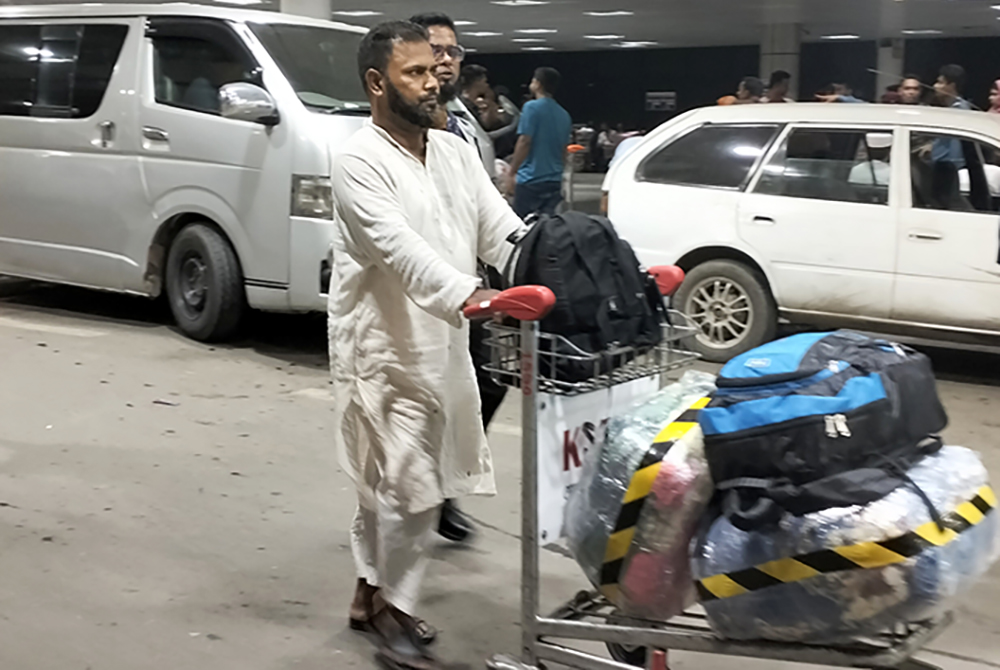
A Bangladeshi man heading to work abroad pushes luggage at the international airport in Dhaka, Bangladesh, on June 9, 2024. (NCR photo/Stephan Uttom Rozario)
12:30 p.m. ET
View from Bangladesh on U.S. election's possible immigration impact
BY STEPHAN UTTOM ROZARIO
DHAKA, BANGLADESH — Michael Biswas, a 40-year-old father of two and an non-governmental organization worker in Bangladesh, is worried about changes to immigration policies in the U.S. if Donald Trump wins the presidential election.
He wants to migrate to America with his family so his sons can go to college there. He believes people have to work hard in America but that human dignity can be found there.
"We live, work, and eat in Bangladesh but I don't get the security of life. After every election in the country, minorities like Christians were attacked and riots and land grabs took place," he told NCR.
If immigration policies in the U.S. change and he can't take his family to the U.S., he said the desire to go will remain unfulfilled. "However, certainly, I will not stay in Bangladesh; I'm sure I'll migrate to [another] country, like in Europe," he added.
Similarly, Argha Ray, a 28-year-old Catholic from Bangladesh, is concerned about Trump's proposed immigration policies. Ray, who visited the U.S. as a tourist and stayed without legal documentation, is now doing part-time work.
"I'm in danger in the U.S. because I'm not legal here. If I am caught by police they may deport me to Bangladesh. But more fear is if the Trump administration will come to power in the next election, because Trump is always against immigrants," he said.
Ray came to the U.S. through a travel agency and spent some $10,000 just to get to this country.
"I spent huge money only for a better life, life security and a brighter future — what I want in my life, all I enjoy in the U.S. If somehow, I am deported, all of my dreams will be destroyed,'' he said.
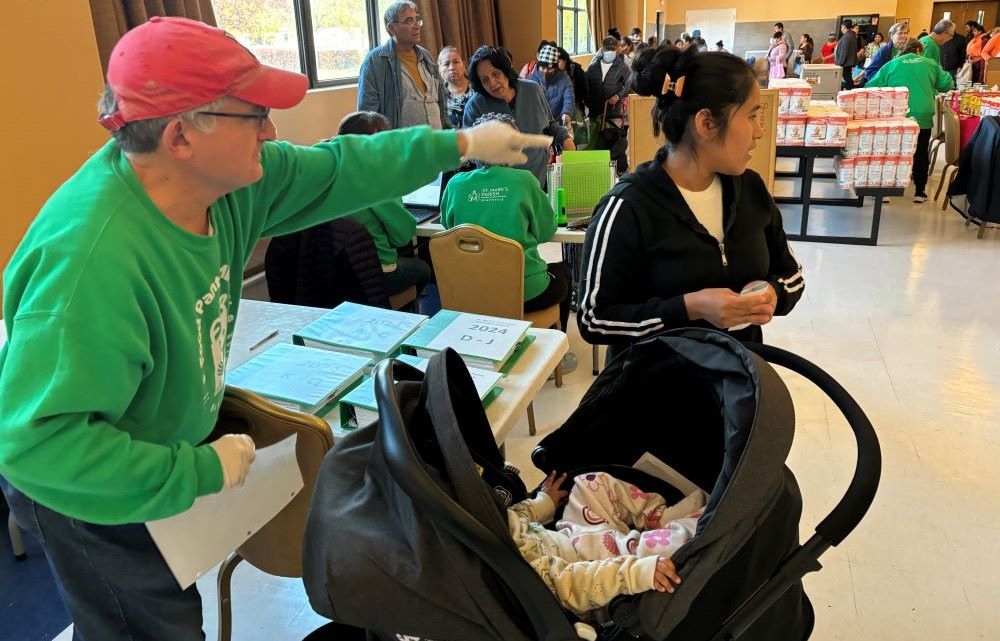
Larry Lojacono directs a pantry client to the food distribution at St. Mark the Evangelist parish. He split his ticket when he voted at St. Mark's before his volunteer shift. (NCR photo/James V. Grimaldi)
11:12 a.m. ET
Prayer, pantry and polls: Maryland parish busy on Election Day
BY JAMES V. GRIMALDI
HYATTSVILLE, Maryland – First Tuesdays of the month are typically busy at St. Mark the Evangelist parish in suburban Washington, D.C. There's the monthly food pantry that attracts hundreds of families, along with the usual three Masses and classes for catechumens.
And, today, throw in a polling place in the gymnasium.
Larry Lojacono, a stalwart of the parish, arrived as the polls opened to vote before heading to the pantry to set up. Lojacono, a Democrat, said he split his ticket for the two big races in Maryland.
For president, it is a foregone conclusion that Kamala Harris will carry the state. But control of the U.S. Senate could hinge on the race pitting former Republican Gov. Larry Hogan against Democratic Prince George's County Executive Angela Alsobrooks. The race is unexpectedly competitive.
For president, Lojacono echoed Pope Francis' U.S. election guidance: "You're picking the best of two evils."
He voted for Harris. "I can't stand the man," he said of Trump.
For Senate, he picked Hogan. Lojacono, 65, said he likes how Hogan is willing to work with Democrats. "I like politicians like Hogan and Liz Cheney," Lojacono said.
"There’s nothing wrong with Alsobrooks," Lojacono said. Alsobrooks was generous to St. Mark's during the pandemic, providing masks and gloves so the pantry could continue and served the community well, he said. "If Alsobrooks wins, I won't be upset. If Trump wins, I will be upset."
Grace Kishna, a member of St. Mark's for more than four decades, also cast her vote before walking to the pantry. She voted for Harris and Alsobrooks. "I made my choice because I don't see Donald Trump as someone I respect and should be president."
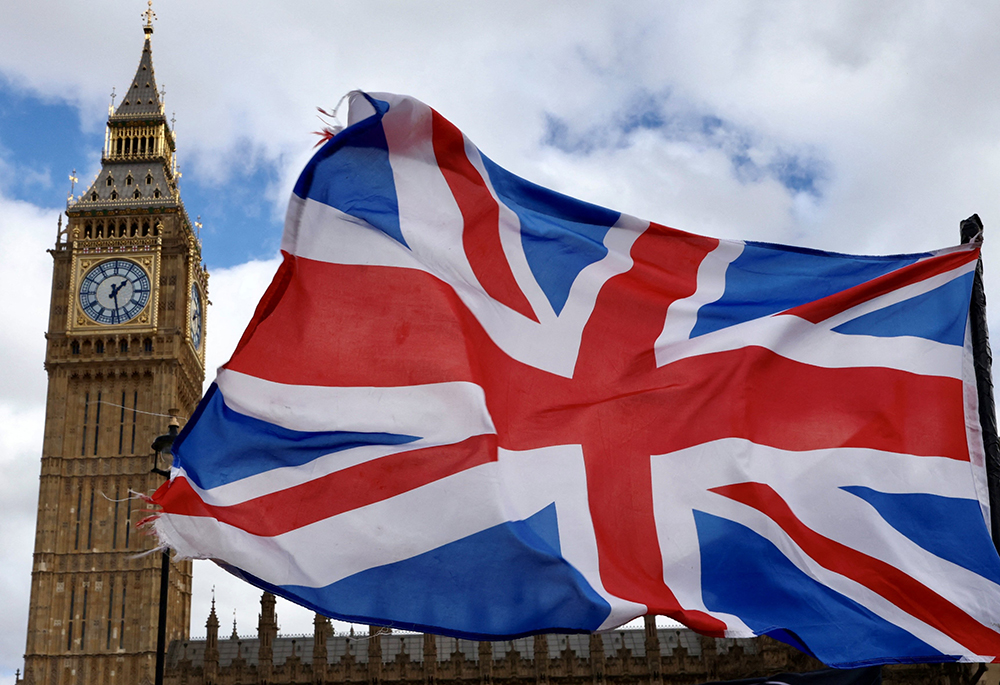
A Union Jack flag flutters in the wind near Big Ben and Parliament in Parliament Square, March 29, 2024, in London. (OSV News photo/Reuters/Kevin Coombs)
10:50 a.m. ET
Election 2024: The view from London
By MICHAEL SEAN WINTERS
I reached out to some friends abroad in the last few days to get their impressions of the U.S. election. Brendan Walsh, the editor of the London-based international Catholic weekly The Tablet, writes that there is frenzied coverage of today's election in the U.K. media.
"It's all much more exciting than our own relatively dreary general election in July," Walsh writes. "Brits, like most Europeans, have a disgusted fascination with Donald Trump. There's no huge enthusiasm for Kamala Harris. While Trump's style is extravagant hyperbole, hers is seen as cliché and platitude: statements of the absurd on the one hand, of the banal on the other. Apart from a few outliers such as the arch Brexiteer Nigel Farage, even on the lib-loathing right of U.K. politics, the mood tends to be never-Trumpian. While many Americans find Trump appalling but funny, Brits tend not to get the joke.
"Should Trump win he will try to subvert the U.S. Constitution and the system of democratic government it upholds if they stand in his way. In our editorial in the current Tablet we suggest that the U.S. system 'was designed from the outset to hold tyranny at bay. The Founding Fathers knew what it had taken to throw off a tyrannical government — British tyranny, in their case — and drew up the principles and rules for a system that had as few as possible of the defects of the colonial administration.'
"They 'saw Trump coming, long ago.' I'm hoping that our thesis that the US system is robust enough to thwart an impetuous bully will not be put to the test."
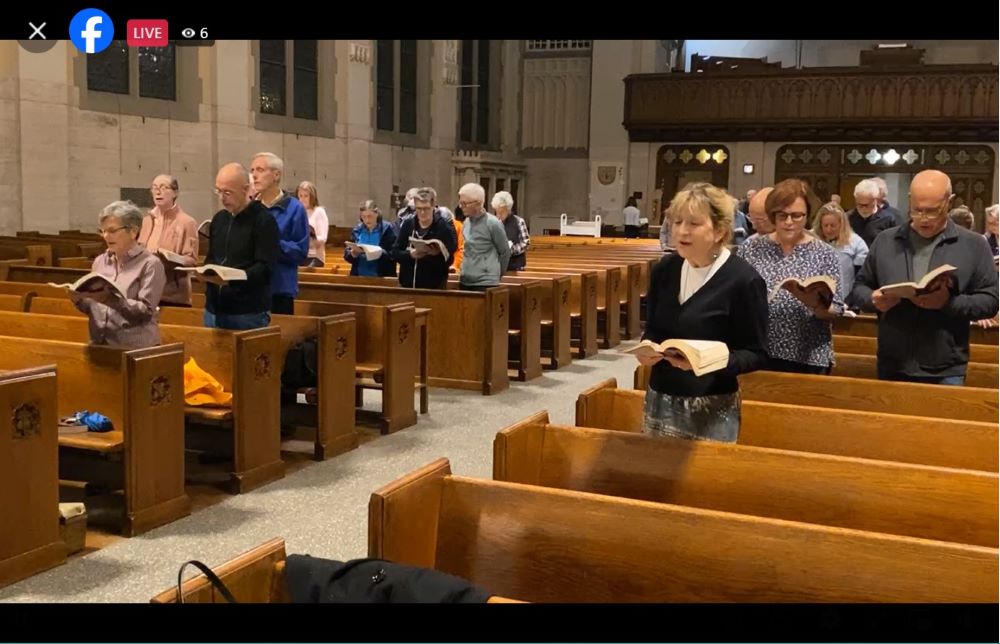
More than 60 members of St. Gertrude Parish in Chicago gather Nov. 4 for an election prayer service. (NCR photo/Heidi Schlumpf)
10 a.m. ET
Chicago parish prays for unity and peace on election eve
BY HEIDI SCHLUMPF
The decision to host an election eve prayer service at St. Gertrude Parish in Chicago was a last-minute decision by the parish council. "We realized that we were all going to need some ministry tonight, that coming together to recommit ourselves to the beloved community would be a good thing," said council co-chair Michelle Nickerson.
More than 60 parishioners showed up Nov. 4 to pray for the country and perhaps to alleviate some of their own fear and anxiety stoked by one of the most contentious elections in the country's history.
"Lord, it's good for us to be here tonight," said Fr. Mike Gabriel, pastor of the North Side parish. "Actually there's no better place than for us to be here tonight, as a community of prayer."
The priest encouraged people in the pews and those watching the livestreamed service to exercise their right to vote, but he also said they have another role: to be part of "a campaign of kindness," no matter how the election turned out.
"Start right now to be an integral part of healing in this country," he said. "Let's stop the anger. Let's stop the hatred and truly live what we say we are. As Christians, we say that we believe that we love one another."
He also encouraged Catholics not to only consider if they are better off now than they were four years ago, but rather to ask, "Is my neighbor better off than my neighbor was four years ago?"
The 30-minute service also featured prayers of the faithful for "our forthcoming president-elect" and others in public service and that the nation, cities and neighborhoods be free from violence in the aftermath of the election.
Earlier in the day, the nonprofit organization Faith in Public Life held an online interfaith "hour of prayer" as the culmination of its Peacemaker Weekend of Witness. The event featured representatives of many faith traditions, including Christian, Buddhist, Hindu and Islam.
Faith in Public Life CEO Jeanné Lewis, who is Catholic, began the service by singing a litany of saints. She prayed for "a peaceful election season" and officials be elected who "lead from their values and from a sense of service."
Advertisement
9:50 a.m. ET
Catholics for Choice holds election-eve prayer service, calls for love and justice amid division
By CAMILLO BARONE
On the eve of Election Day, Catholics for Choice held a virtual prayer service, inviting pro-choice Catholics to gather in solidarity and reflection. With more than 50 attendees from multiple states, the gathering was intended to offer a sanctuary for those who may feel alienated from traditional Catholic spaces that oppose reproductive choice, organizers said.
Stephanie Hanson-Quintana, Catholics for Choice’s Director of organizing and movement building, led a reflection centered on a passage from Paul's letters to the Corinthians, emphasizing love as a lasting, active force. In her reflection, Hanson-Quintana noted that many have expressed frustration with how the pulpit in American Catholic parishes has been used to enforce messages that conflict with their conscience. In response, she said, Catholics for Choice provided liturgical resources to encourage pro-choice Catholics to pray and reflect.
The prayer service also included petitions for voters, poll workers, and advocates for reproductive rights. Special prayers were offered for those in states where reproductive rights were on the ballot, including Arizona, Florida, Missouri and Colorado. "We pray that your freedoms are enshrined and protected, leaving a legacy for future generations," Hanson-Quintana said.
A key theme of the evening was the role of love as a guiding force in times of division and urging the attendees to consider love's role in both protecting others and challenging injustice.
As the service concluded, attendees prayed the Our Father and offered petitions for peace and protection at the polls. They invoked the guidance of Mary Undoer of Knots, a figure within Catholic tradition often called upon in moments of difficulty and conflict. "Through you, we honor Catholic social justice. Through you, we honor reproductive justice," the closing prayer stated.
4:00 a.m. ET
Obama's appeals to faith, character in Milwaukee resonate with some Catholic voters
By HEIDI SCHLUMPF
MILWAUKEE — On the last day of early voting in Wisconsin, former President Barack Obama campaigned in the crucial swing state, saying "values matter" and "character matters" when choosing between Vice President Kamala Harris and former President Donald Trump.
One of the "most disturbing things about this election," Obama said on Nov. 3, "is how we seem to have just set aside the values we were taught."
Obama cited Trump's falsehoods about the federal emergency response to those affected by Hurricane Helene last month.
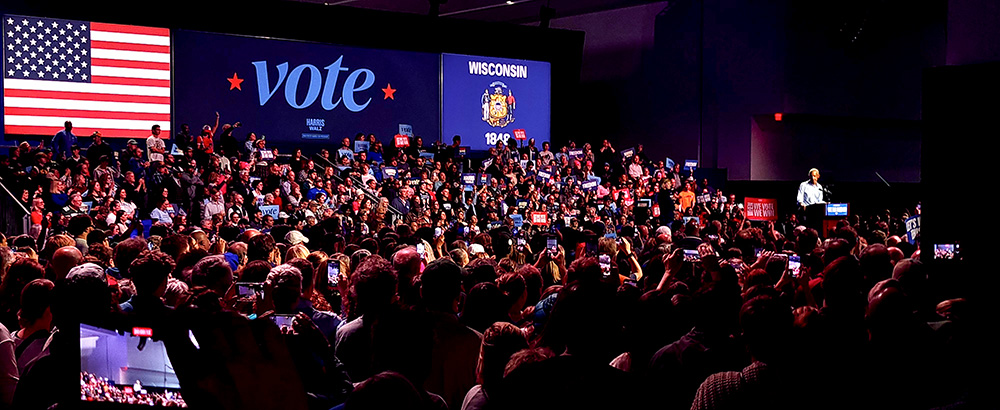
President Barack Obama speaks to a crowd of nearly 5,000 at the Baird Center in downtown Milwaukee Nov. 3. (Samuel Butler)
"At a time when people were desperate and needed help, why would you try to exploit that for political gain?" Obama asked. "No matter where you stand on the issues, no matter what party you belong to, why would you go along with that?"
The former president touched on the economy, immigration, health care, abortion and reproductive rights, which got some of the loudest cheers from the crowd of nearly 5,000.
Obama noted state abortion bans, rising infant mortality rates, and doctors who are afraid to give life-saving treatment for at-risk mothers since the overturning of Roe vs. Wade.
"I've always said I respect those who, for religious or ethical reasons, would not consider terminating their own pregnancy," Obama said. "But if nothing else, freedom must surely mean that women themselves get to make these profoundly intimate decisions, not politicians."
Catholic voter Janet Radtke, a retired registered nurse from Germantown, said reproductive rights was one of the main reasons she supports Harris. "I believe in pro-life and pro-choice," she said, noting the difficult cases of rape, incest and the threats to the life of the mother.
"Sometimes it's not a black-and-white issue," Radtke said.
Lorie Skeff, a member of Our Lady of Lourdes Parish in Milwaukee, said she supports Harris and running mate Minnesota Gov. Tim Walz because she believes they will bring unity as well as practical policies to Wisconsin. "A lot of great things are happening in Minnesota that I wish we had in Wisconsin," she said.
Skeff also said the Democratic ticket aligns with her belief in the need to "love thy neighbor as thyself."
